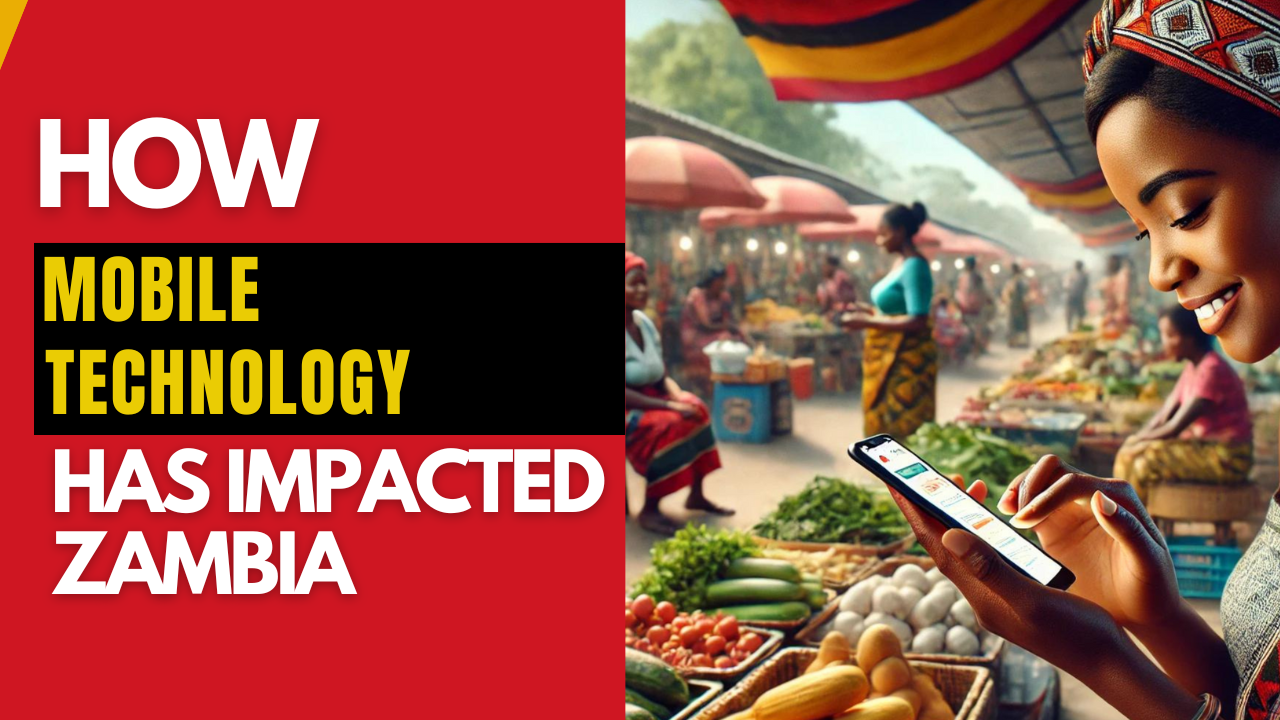From Communication to Commerce
Mobile technology has become a transformative force in Zambia, revolutionizing how people communicate, conduct business, access information, and improve their daily lives. Here’s a detailed look at the profound impact of mobile technology and how it continues to shape various aspects of life in Zambia.
1. Revolutionizing Communication Across Zambia

Mobile technology has significantly enhanced communication across Zambia, making it easier for people to stay connected. With extensive mobile network coverage, even in rural areas, mobile phones have become essential tools for communication. Popular messaging apps like WhatsApp and social media platforms such as Facebook enable instant, affordable communication, bridging distances and fostering stronger connections among Zambians.
2. Mobile Money Services: A Financial Inclusion Breakthrough
One of the most transformative impacts of mobile technology in Zambia is the widespread adoption of mobile money services. Platforms such as MTN Mobile Money, Airtel Money, and Zamtel Kwacha have revolutionized financial transactions by allowing users to send and receive money, pay bills, and purchase goods and services directly from their mobile phones. This has significantly increased financial inclusion, particularly for those without access to traditional banking services, empowering Zambians to participate more fully in the economy.
3. Expanding Access to Information and Education
The proliferation of mobile technology has opened up vast new avenues for accessing information and education in Zambia. Internet-enabled mobile phones allow Zambians to access online courses, educational resources, and global news, making it easier for students and professionals to enhance their knowledge and skills. This has been especially beneficial in rural areas where access to traditional educational resources may be limited.
4. Driving E-Commerce and Business Innovation
The rise of e-commerce in Zambia is closely tied to the growth of mobile technology. Entrepreneurs and small businesses are leveraging social media platforms to market and sell their products, reaching wider audiences than ever before. Online marketplaces like ShopZed and Afrishop provide convenient shopping experiences, allowing consumers to purchase goods from the comfort of their homes. Mobile payment solutions have further streamlined transactions, making it easier and more secure to do business in Zambia.
5. Transforming Healthcare with Mobile Technology
Mobile technology is playing a pivotal role in transforming healthcare in Zambia. Telemedicine services enable patients to consult with doctors remotely, reducing the need for travel and increasing access to medical care. Health information, appointment reminders, and medication alerts can be delivered via SMS, improving patient adherence and health outcomes. Additionally, mobile apps are being used to track and manage diseases, providing valuable data for health interventions and policy-making.
6. Supporting Agriculture and Farmers
For Zambia’s agricultural sector, mobile technology offers vital support. Farmers can access timely weather updates, market prices, and farming tips via SMS services, helping them make informed decisions. Mobile platforms also facilitate the sale of produce, connecting farmers directly with buyers and reducing their reliance on intermediaries. This has led to better market access and improved livelihoods for many Zambian farmers.
7. Enhancing Entertainment and Social Interaction
Mobile phones have become a key source of entertainment for Zambians, offering access to music, videos, games, and social media platforms. These platforms not only provide leisure activities but also foster social interaction and community building, making mobile technology an integral part of daily life in Zambia.
8. Overcoming Challenges and Seizing Opportunities
Despite the many benefits, there are challenges to the widespread adoption of mobile technology in Zambia. Issues such as network reliability, high data costs, and varying levels of digital literacy can hinder access and usage. However, these challenges also present opportunities for growth and development. Continued investment in mobile infrastructure, affordable data plans, and digital education will be crucial in overcoming these obstacles and maximizing the potential of mobile technology in Zambia.
Conclusion: Embracing the Future of Mobile Technology in Zambia
Mobile technology has had a profound impact on everyday life in Zambia, revolutionizing communication, financial inclusion, education, healthcare, and much more. While challenges remain, the benefits are undeniable, and the future holds even greater promise. By embracing and leveraging mobile technology, Zambia can continue to advance, improving the quality of life for its people and fostering a more connected, informed, and prosperous society.


